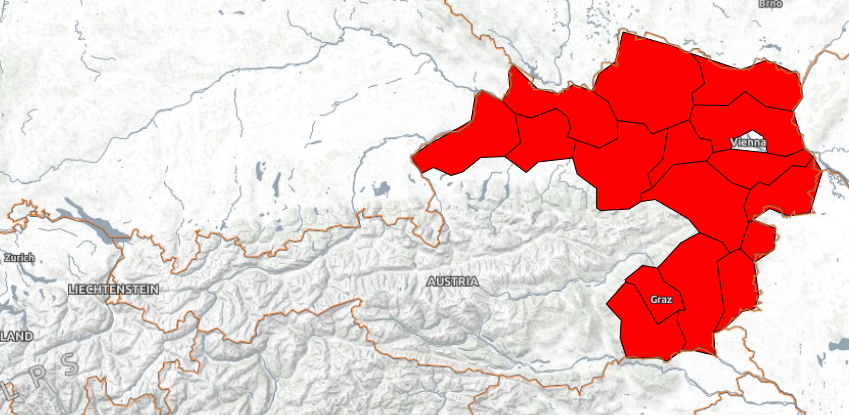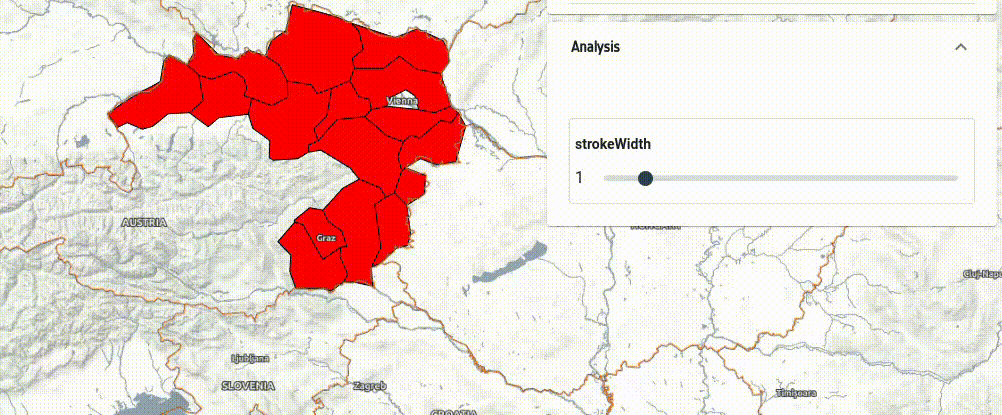Styling
For vector and raster data eodash uses a shared JSON style definition with use of OpenLayers flat style and JSON Form definition language as extended by the EOxElement eox-jsonform and eox-layercontrol-legend
Vector styling
Basic example of how to style vector data:
{
"fill-color": "red",
"stroke-color": "black",
"stroke-width": 1
}Changing style UI

In order to define interaction options for the user this can be extended with variables, combined with JSON Form definition. To continue the example, let's say, we would like the user to be able to change the stroke-width with a slider, we can extend the style file like this:
{
"variables": {
"strokeWidth": 1
},
"fill-color": "red",
"stroke-color": "black",
"stroke-width": ["var", "strokeWidth"],
"jsonform": {
"type": "object",
"title": "Data configuration",
"properties": {
"strokeWidth": {
"type": "number",
"minimum": 0,
"maximum": 10,
"format": "range",
"default": 0
}
}
}
}The name of variable strokeWidth needs to match between variables object, variable inside the flatstyle properties (stroke-width) and jsonform.properties.

Tips and tricks
Taking these concepts into account, one can extend the style to use also the get functionality of flat styles to access feature properties of the geoJSON as well as encoded expressions truly custom and interactive styles can be created.
There are a few interesting tricks for properties, which "somehow do not fit".
If property value is a number, it needs to be converted to a string, which can be done with: to-string or concat:
"text-value": ["to-string", ["get", "numberproperty"]],
"text-value": ["concat", ["get", "numberproperty"], "somestring, e.g. unit of measurement"],
If there are null values in the data, it can happen that the style is not applied to the features at all. A workaround for that is to use coalesce which returns the first element that does not resolve to null.
Therefore if the feature property is null it will return "N/A" in this case
"text-value": ["to-string",["coalesce", ["get", "propertywithsomenullvalues"], "N/A"]],.
Combining that with accessing nested properties the result looks like:
{
"text-value":[
"to-string",
[
"coalesce",
[
"get",
"topproperty",
"subproperty",
"subsubproperty"
],
"N/A"
]
]
}Other examples
Example of color range applied to style Ice charts data according to the Sea Ice Concentration percentage with values 0-100.
{
"tooltip": [{"id": "CT", "title": "CT"}],
"fill-color": [
"case",
["!", ["get", "CT"]],
[0, 0, 0, 0],
["<", ["get", "CT"], 0],
[0, 0, 255, 0],
["<=", ["get", "CT"], 10],
[150, 200, 255, 1],
["<=", ["get", "CT"], 40],
[140, 255, 159, 1],
["<=", ["get", "CT"], 70],
[255, 255, 0, 1],
["<=", ["get", "CT"], 90],
[255, 125, 7, 1],
["<=", ["get", "CT"], 100],
[255, 0, 0, 1],
[0, 0, 255, 1]
],
"stroke-color": "black",
"stroke-width": 1
}Hidden fields
It is possible to hide certain fields via "options": {"hidden": true},to create "composed" fields for reuse later in the styles.
In this example a tooltip content is created from a hidden field, which is a composite of values from three other selection fields ship_class, type_of_ice and type_of_visualization via a watch syntax. Also see enum_titles property for human readable labels of fields.
{
"jsonform": {
"type": "object",
"title": "Data configuration",
"properties": {
"type_of_visualisation": {
"title": "Type of Visualisation",
"type": "string",
"enum": [
"airss",
"WMO Concentration"
],
"options": {
"enum_titles": [
"AIRSS Ice Numeral Go/No Go",
"WMO Concentration"
]
},
"default": "airss"
},
"ship_class": {
"title": "Ship Class",
"type": "string",
"enum": [
"type_a",
"type_b",
"type_c",
"type_d",
"type_e",
"type_cac3",
"type_cac4"
],
"options": {
"enum_titles": [
"Type A",
"Type B",
"Type C",
"Type D",
"Type E",
"Type CAC3",
"Type CAC4"
]
},
"default": "type_a"
},
"type_of_ice": {
"title": "Type of Ice (decayed/standard)",
"type": "string",
"enum": ["standard", "ridged"],
"default": "standard"
},
"combined_prop": {
"type": "string",
"template": "{{vis}}_{{ice}}_{{ship}}_go_no_go",
"options": {"hidden": true},
"watch": {
"vis": "type_of_visualisation",
"ice": "type_of_ice",
"ship": "ship_class"
}
}
}
},
"tooltip": [
{"id": "wmo_concentration", "title": "WMO Concentration"},
{"id": "wmo_stage_of_development", "title": "Stage of development"},
{
"id": "{{combined_prop}}",
"title": "AIRSS value (ship class: {{ship_class}} ice: {{type_of_ice}})"
}
],
"variables": {
"ship_class": "type_a",
"type_of_ice": "standard",
"type_of_visualisation": "airss",
"combined_prop": "airss_standard_type_a_go_no_go"
},
"fill-color": [
"case",
["==", ["var", "type_of_visualisation"], "WMO Concentration"],
[
"match",
["get", "wmo_concentration"],
"Ice Free",
[0, 100, 255, 1],
"Open Water (< 1/10 ice)",
[150, 200, 255, 1],
"Bergy Water",
[150, 200, 255, 1],
"1/10 - 3/10",
[140, 255, 160, 1],
"4/10 - 6/10",
[255, 255, 0, 1],
"7/10 - 8/10",
[255, 125, 5, 1],
"9/10 - 10/10",
[255, 0, 0, 1],
"8/10 - 9/10",
[255, 0, 0, 1],
"8/10 - 10/10",
[255, 0, 0, 1],
"7/10 - 9/10",
[255, 125, 7, 1],
"6/10 - 7/10",
[255, 125, 7, 1],
"5/10 - 7/10",
[255, 255, 0, 1],
"3/10 255 5/10",
[255, 255, 0, 1],
"3/10 255 4/10",
[255, 255, 0, 1],
"2/10 255 4/10",
[255, 255, 0, 1],
"Unknown/Undetermined",
[255, 255, 255, 1],
[255, 255, 255, 1]
],
["==", ["var", "type_of_visualisation"], "airss"],
[
"case",
["==", ["get", "polygon_type"], "Ice Free"],
[0, 100, 255],
["==", ["get", ["var", "combined_prop"]], "<= 0 IN < 2"],
[217, 239, 139, 1],
["==", ["get", ["var", "combined_prop"]], "<= 2 IN < 5"],
[166, 217, 106, 1],
["==", ["get", ["var", "combined_prop"]], "<= 5 IN < 10"],
[102, 189, 99, 1],
["==", ["get", ["var", "combined_prop"]], "IN > 10"],
[26, 152, 80, 1],
["==", ["get", ["var", "combined_prop"]], "<= -2 IN < 0"],
[255, 135, 135, 1],
["==", ["get", ["var", "combined_prop"]], "<= -5 IN < -2"],
[255, 82, 82, 1],
["==", ["get", ["var", "combined_prop"]], "<= -10 IN < -5"],
[255, 0, 0, 1],
[0, 0, 0, 1]
],
[0, 0, 0, 1]
],
"stroke-color": "black",
"stroke-width": 1
}Raster styling
Here is a more elaborate example which shows the use of ["band", 1] to access values from two single band COGs, as well as normalizing the data to 0-1 values, and then applying a interpolated 16 value viridis colormap. The vmin and vmax variables are used to do the normalization allowing dynamic color range adaptation in the eodash instance.
It uses band 2, to filter what data gets rendered, if the case does not apply, it renders the corresponding pixel as transparent.
Additionally a dynamic legend is defined using the domainProperties referencing the jsonform and style variables vmin and vmax. These properties can be named differently for other datasets, but need to end with min and max. Hex color code (#ff00ff) strings can be used as well for both legend and color.
{
"variables": {
"vmin": 2,
"vmax": 5,
"settlementDistance": 0
},
"color": [
"case",
[
"all",
[">", ["band", 1], 1],
[">=", ["band", 2], ["var", "settlementDistance"]]
],
[
"interpolate",
["linear"],
["/", ["-", ["band", 1], ["var", "vmin"]], ["-", ["var", "vmax"], ["var", "vmin"]]],
0, [68, 1, 84, 1],
0.067, [70, 23, 103, 1],
0.133, [71, 44, 122, 1],
0.2, [65, 63, 131, 1],
0.266, [59, 81, 139, 1],
0.333, [52, 97, 141, 1],
0.4, [44, 113, 142, 1],
0.467, [39, 129, 142, 1],
0.533, [33, 144, 141, 1],
0.6, [39, 173, 129, 1],
0.666, [66, 187, 114, 1],
0.733, [92, 200, 99, 1],
0.8, [131, 210, 75, 1],
0.867, [170, 220, 50, 1],
0.933, [212, 226, 44, 1],
1, [253, 231, 37, 1]
],
[
"color", 0, 0, 0, 0
]
],
"legend": {
"title": "[kWh/m²/day]",
"range": [
"rgba(68, 1, 84, 1)",
"rgba(70, 23, 103, 1)",
"rgba(65, 63, 131, 1)",
"rgba(59, 81, 139, 1)",
"rgba(52, 97, 141, 1)",
"rgba(44, 113, 142, 1)",
"rgba(39, 129, 142, 1)",
"rgba(33, 144, 141, 1)",
"rgba(39, 173, 129, 1)",
"rgba(66, 187, 114, 1)",
"rgba(92, 200, 99, 1)",
"rgba(131, 210, 75, 1)",
"rgba(170, 220, 50, 1)",
"rgba(212, 226, 44, 1)",
"rgba(253, 231, 37, 1)"
],
"domainProperties": ["vmin", "vmax"]
},
"jsonform": {
"type": "object",
"title": "Data configuration",
"properties": {
"settlementDistance": {
"type": "number",
"minimum": 0,
"maximum": 5000,
"format": "range",
"default": 0
},
"vminmax": {
"title": "Global horizontal irradiation",
"description": "[kWh/m²/day]",
"type": "object",
"properties": {
"vmin": {
"type": "number",
"minimum": 0,
"maximum": 5,
"format": "range",
"default": 2
},
"vmax": {
"type": "number",
"minimum": 0,
"maximum": 5,
"format": "range",
"default": 5
}
},
"format": "minmax"
}
}
}
}Here is how that translates to a visualization in the eodash instance (without the legend):

Controlling which bands to use via UI
Style variables and jsonform can be used to let user switch between bands or even data properties.
For example following style allows to access 6 hourly predictions of Ice drift from Sentinel 1 scenes over the same geographical area/extent and adapt color stretch:
{
"legend": {
"title": "S1 Scene",
"range": [
"rgba(0, 0, 0, 1)",
"rgba(255, 255, 255, 1)"
],
"domainProperties": ["vmin", "vmax"]
},
"variables": {
"vmin": 0,
"vmax": 1000,
"prediction_hour": 1
},
"color": [
"case",
[">", ["band", ["var", "prediction_hour"]], 0],
[
"interpolate",
["linear"],
[
"/",
["-", ["band", ["var", "prediction_hour"]], ["var", "vmin"]],
["-", ["var", "vmax"], ["var", "vmin"]]
],
0,
[0, 0, 0, 1],
1,
[255, 255, 255, 1]
],
["color", 0, 0, 0, 0]
],
"jsonform": {
"type": "object",
"title": "Data configuration",
"properties": {
"prediction_hour": {
"type": "number",
"minimum": 1,
"maximum": 6,
"step": 1,
"format": "range",
"default": 1
},
"vminmax": {
"title": "S1 warped predictions",
"type": "object",
"properties": {
"vmin": {
"type": "number",
"minimum": 0,
"maximum": 3000,
"format": "range",
"default": 0
},
"vmax": {
"type": "number",
"minimum": 0,
"maximum": 3000,
"format": "range",
"default": 1000
}
},
"format": "minmax"
}
}
}
}